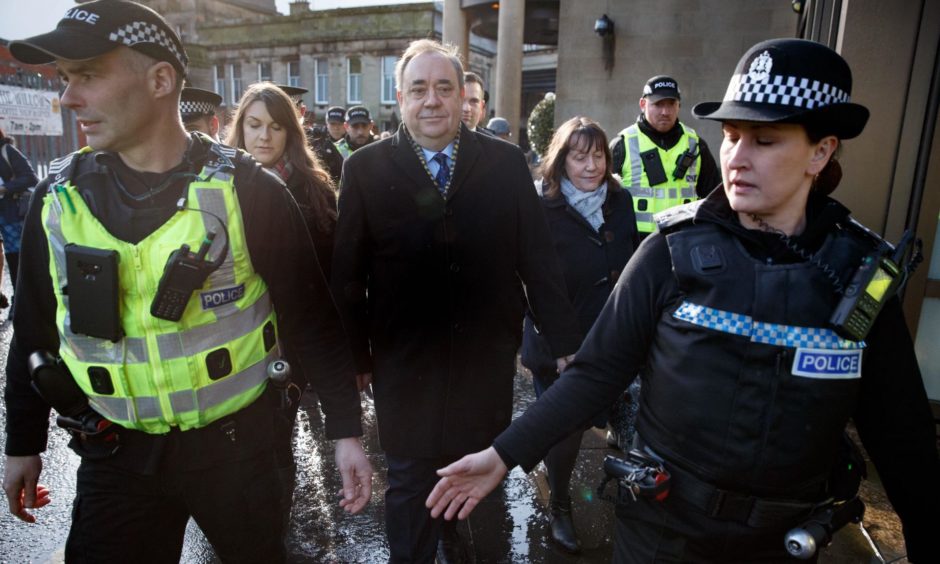Nicola Sturgeon claims her critics are willing to “sacrifice” the reputation of the nation’s justice system on the “altar of the ego” of Alex Salmond.
The first minister attacked what she branded a “scorched earth policy”, as she launched a defence of the independence of the Crown Office and lord advocate.
It follows claims that the prosecution service moved to “censor” evidence from Mr Salmond within hours of it being published by the parliament this week.
Scottish Conservative Holyrood leader Ruth Davidson, Labour’s Jackie Baillie and Liberal Democrat Willie Rennie all raised the handling of issues relating to the inquiry at first minister’s questions, after a dramatic week of claim and counter claim.
The Crown Office contacted the Scottish Parliament within hours of it publishing Mr Salmond’s submission to the committee that is investigating the way the Scottish Government handled harassment allegations against the former first minister.
The document was then taken down and subsequently republished with redactions, but a spokesman for Mr Salmond branded the intervention “astonishing” and “irregular”.
Ms Davidson claimed Ms Sturgeon had been “desperate to shut down” evidence that “confirms that she misled parliament” on when she found out about allegations against Mr Salmond.
The Tory MSP said: “Does the first minister understand why the public, to the public, this looks like a cover up, when the exact evidence that is being redacted is the most damaging to her personally?”
‘Deluded conspiracy theory’
Ms Sturgeon said every allegation against her was addressed in her written evidence to the committee last year, as she warned against peddling a “dangerous and quite deluded conspiracy theory”.
The first minister said: “Scrutiny of me is important, is necessary, it’s entirely legitimate.
“What is not legitimate is to pursue a conspiracy theory, a scorched earth policy, that threatens the reputation and the integrity of Scotland’s independent justice institutions, just because you happen to dislike this government.
“And to sacrifice all of that, if I may say so, presiding officer, on the altar of the ego of one man.”
‘The right thing to do’
Ms Sturgeon also dismissed claims she had been part of any cover up.
“For somebody in my position, somebody hearing what my predecessor, close colleague, friend of 30 years was accused of, the easier thing to do, perhaps, and perhaps the thing in days gone by that would have been done, was to sweep these complaints under the carpet and not to allow them to be properly investigated,” she said.
“I opted not to do that. Whatever difficulties have happened since then, whatever pain has been caused to lots of people in this process, I don’t regret not sweeping the complaints under the carpet, because that was the right thing to do.”
Mr Salmond is poised to appear before the inquiry on Friday, having made explosive allegations that senior figures in the Scottish Government and SNP attempted to ruin his reputation and even have him jailed.
Ms Sturgeon is then expected to be the committee’s final witness on Wednesday.
Sturgeon, Salmond and public discourse
Earlier, a spokesman for the Faculty of Advocates issued a strongly-worded statement about the tone of the discussion relating to the Salmond inquiry.
“The Faculty of Advocates is becoming increasingly concerned at the debate, both in the media and in parliament, in relation to the parliamentary committee into the investigation of harassment allegations.
“The debate appears increasingly to be focused on the courts and Crown Office.
“The faculty wishes to remind all concerned of the importance of maintaining confidence in the judicial system and in the rule of law.
“Maintaining that confidence requires, amongst other things, recognition of the importance of the independent role of the lord advocate, the independent role of the courts and, perhaps most importantly, the vital place of the verdicts of impartial juries in criminal proceedings.
“No one in public life is beyond reproach, and healthy public debate surrounding the justice system is to be encouraged.
“However, when the public discourse fails to respect the basic tenets of the independence of the system, it is in danger of leading to irreparable harm.
“Such harm is something which might be to the detriment of Scotland as a whole in the long term.”


